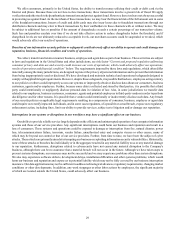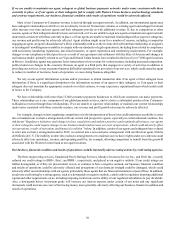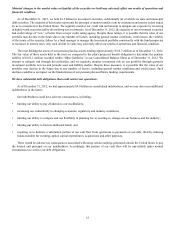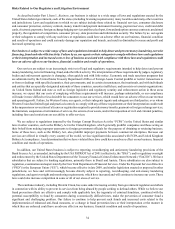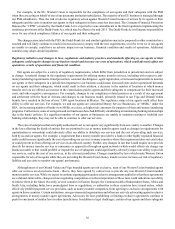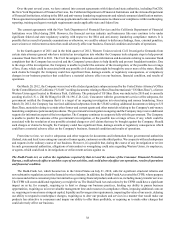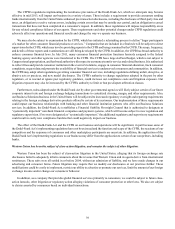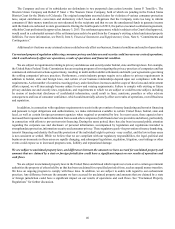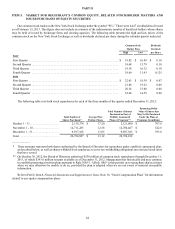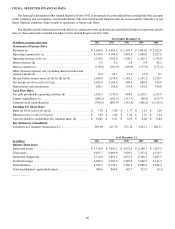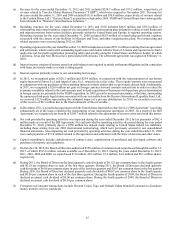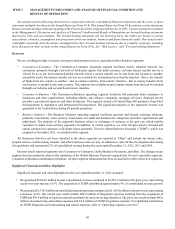Western Union 2012 Annual Report Download - page 44
Download and view the complete annual report
Please find page 44 of the 2012 Western Union annual report below. You can navigate through the pages in the report by either clicking on the pages listed below, or by using the keyword search tool below to find specific information within the annual report.39
The CFPB's regulations implementing the remittance provisions of the Dodd-Frank Act, which we anticipate may become
effective in mid-2013, will impact our business in a variety of areas. These include: a requirement to provide consumers sending
funds internationally from the United States enhanced pre-transaction disclosures, including the disclosure of third-party fees and
taxes, an obligation to resolve various errors, including certain errors that may be outside our control, and an obligation to cancel
transactions that have not been completed at a consumer's request. In addition, these regulations will impose responsibility on us
for any related compliance failures of our agents. These requirements and other potential changes under CFPB regulations could
adversely affect our operations and financial results and change the way we operate our business.
We may also be subject to examination by the CFPB, which has initiated a rulemaking process to define “larger participants
of a market for other consumer financial products or services.” Companies that are included in a final rule will be subject to direct
supervision by the CFPB, which may involve providing reports to the CFPB and being examined by the CFPB. The scope, frequency,
and details of these reports and examinations are still being developed by the CFPB. In addition, the CFPB has broad authority to
enforce consumer financial laws. In July 2011, many consumer financial protection functions formerly assigned to the federal
banking agency and other agencies were transferred to the CFPB. The CFPB has a large staff and budget, which is not subject to
Congressional appropriation, and has broad authority with respect to our money transfer service and related business. It is authorized
to collect fines and provide consumer restitution in the event of violations, engage in consumer financial education, track consumer
complaints, request data and promote the availability of financial services to underserved consumers and communities. In addition,
the CFPB may adopt other regulations governing consumer financial services, including regulations defining unfair, deceptive, or
abusive acts or practices, and new model disclosures. The CFPB's authority to change regulations adopted in the past by other
regulators, or to rescind or ignore past regulatory guidance, could increase our compliance costs and litigation exposure. Our
litigation exposure may also be increased by the CFPB's authority to limit or ban pre-dispute arbitration clauses.
Furthermore, rules adopted under the Dodd-Frank Act by other governmental agencies will likely subject certain of our future
corporate interest rate and foreign exchange hedging transactions to centralized clearing, margin, and other requirements. Also,
our Business Solutions business in the United States will be subjected to increased regulatory oversight and reporting requirements
relating to the foreign exchange derivative products offered to certain of its customers. Our implementation of these requirements
could impact our business relationships with banking and other financial institution partners who offer our Business Solutions
services. In addition, the Dodd-Frank Act establishes a Financial Stability Oversight Counsel that is authorized to designate as
“systemically important” non-bank financial companies and payment systems, which will become subject to new regulation and
regulatory supervision. If we were designated as “systemically important,” the additional regulatory and supervisory requirements
could result in costly new compliance burdens that could negatively impact our business.
The effect of the Dodd-Frank Act and the CFPB on our business and operations will be significant, in part because some of
the Dodd-Frank Act's implementing regulations have not been issued and the function and scope of the CFPB, the reactions of our
competitors and the responses of consumers and other marketplace participants are uncertain. In addition, the application of the
Dodd-Frank Act's implementing regulations to our business may differ from the application to certain of our competitors, including
banks.
Western Union has been the subject of class-action litigation, and remains the subject of other litigation.
Western Union has been the subject of class-action litigation in the United States, alleging that its foreign exchange rate
disclosures failed to adequately inform consumers about the revenue that Western Union and its agents derive from international
remittances. These suits were all settled in or before 2004, without an admission of liability, and we have made changes in our
advertising and consumer forms. Future litigation may require that we modify our disclosures or our practices further. These
modifications could be costly to implement, restrict our ability to advertise or promote our services, limit the amount of our foreign
exchange income and/or change our consumers' behavior.
In addition, as a company that provides global financial services primarily to consumers, we could be subject to future class-
action lawsuits, other litigation or regulatory action alleging violations of consumer protection or other laws. We also are subject
to claims asserted by consumers based on individual transactions.


